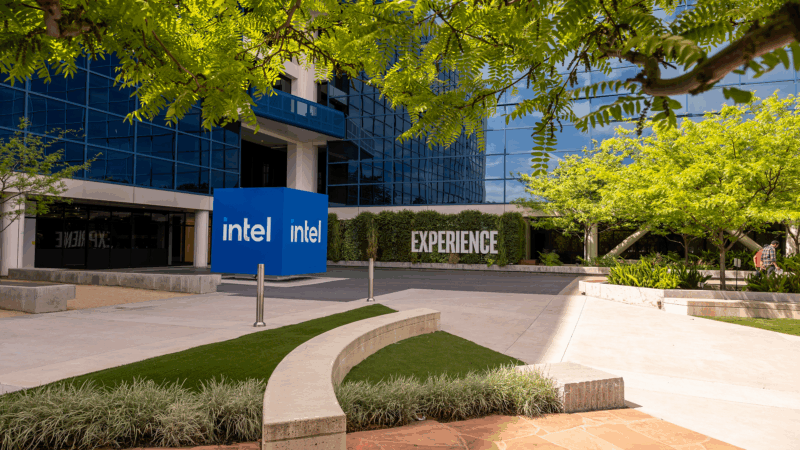Intel will give the U.S. government a 10% stake, Trump says
President Trump said on Friday he had asked Intel CEO Lip-Bu Tan for a 10% stake in the company during a recent meeting at the White House.
“He agreed, and they’ve agreed to do it, and I think it’s a great deal for them,” Trump told reporters. “He walked in wanting to keep his job, and he ended up giving us $10 billion for the United States,” Trump said.
Neither Intel nor the White House press team immediately responded to requests for comment.
But should such a deal move ahead, it would be a highly unusual step — it would mark an escalation in the Trump administration’s efforts to push chipmakers to manufacture in the United States, and a new milestone in how willing CEOs are to cede the president an unprecedented amount of control over their companies.
The nature of how a deal might work is not yet clear — and neither is the response of Intel’s board or shareholders.
Earlier this week, Commerce Secretary Howard Lutnick told CNBC that a potential deal for an Intel stake would convert grants to Intel from the 2022 CHIPS and Science Act into equity. The law authorized a total of nearly $53 billion in government funding for chip-related activities.
“So we’ll deliver the money, which was already committed under the Biden administration. We’ll get equity in return for it,” Lutnick said, adding the stake would not give the government voting or governance rights in Intel.
After Trump’s remarks, Lutnick posted on X that the U.S. “now owns 10% of Intel,” and he called it a “historic agreement.”
Intel, once a leader in chip production, has faced a raft of problems in recent years.
It has stumbled in the race to feed soaring data center demand for chips used to build artificial intelligence models known as graphics processing units, or GPUs. The leader in that field is Intel’s Santa Clara, California-based neighbor Nvidia, now the world’s biggest company with a market capitalization of over $4 trillion.
(Earlier in August, Trump announced that Nvidia would pay the U.S. government 15% of its revenues of H20 chip sales in China in exchange for being allowed to sell them there. An Nvidia spokesperson declined to comment to NPR on the 15% figure, and in a statement, the company said it follows “rules the U.S. government sets for our participation in worldwide markets.”)
Intel’s revenue has fallen in recent years, driving its market capitalization down. This year, the company reported net losses for the first two quarters.
President Trump took direct aim at Intel CEO Tan earlier this month, calling on him to resign following reports he invested in a range of Chinese tech companies. Days later, Tan went to the White House for a face-to-face meeting with the president, after which Trump called the meeting “interesting” and Tan a “success.”
Intel is planning to invest more than $28 billion in two chip production facilities in Ohio, but the plans have been delayed and analysts say it is unclear if there will be sufficient demand for the chips the company eventually produces.
“One of the questions that we still haven’t seen answers to yet in the public sphere, at least, is how this discussion about equity financing relates to the question of who’s going to be the customer for Intel’s factories that are being built and their processes or their manufacturing processes that are being brought online,” said Chris Miller, a professor at Tufts University and the author of Chip War: The Fight for the World’s Most Critical Technology.
“That’s a key part of the puzzle,” he said, adding it was too early to know if a potential equity deal would be a boon for Intel or complicate the company’s efforts to try to lead the field again.
‘One year of failure.’ The Lancet slams RFK Jr.’s first year as health chief
In a scathing review, the top US medical journal's editorial board warned that the "destruction that Kennedy has wrought in 1 in office might take generations to repair."
Here’s how world leaders are reacting to the US-Israel strikes on Iran
Several leaders voiced support for the operation – but most, including those who stopped short of condemning it, called for restraint moving forward.
How could the U.S. strikes in Iran affect the world’s oil supply?
Despite sanctions, Iran is one of the world's major oil producers, with much of its crude exported to China.
Why is the U.S. attacking Iran? Six things to know
The U.S. and Israel launched military strikes in Iran, targeting Khamenei and the Iranian president. "Operation Epic Fury" will be "massive and ongoing," President Trump said Saturday morning.
Sen. Tim Kaine calls on the Senate to vote on the war powers resolution
NPR's Scott Simon talks to Sen. Tim Kaine, D-Va., about the U.S. strikes on Iran.
Iran strikes were launched without approval from Congress, deeply dividing lawmakers
Top lawmakers were notified about the operation shortly before it was launched, but the White House did not seek authorization from Congress to carry out the strikes.





